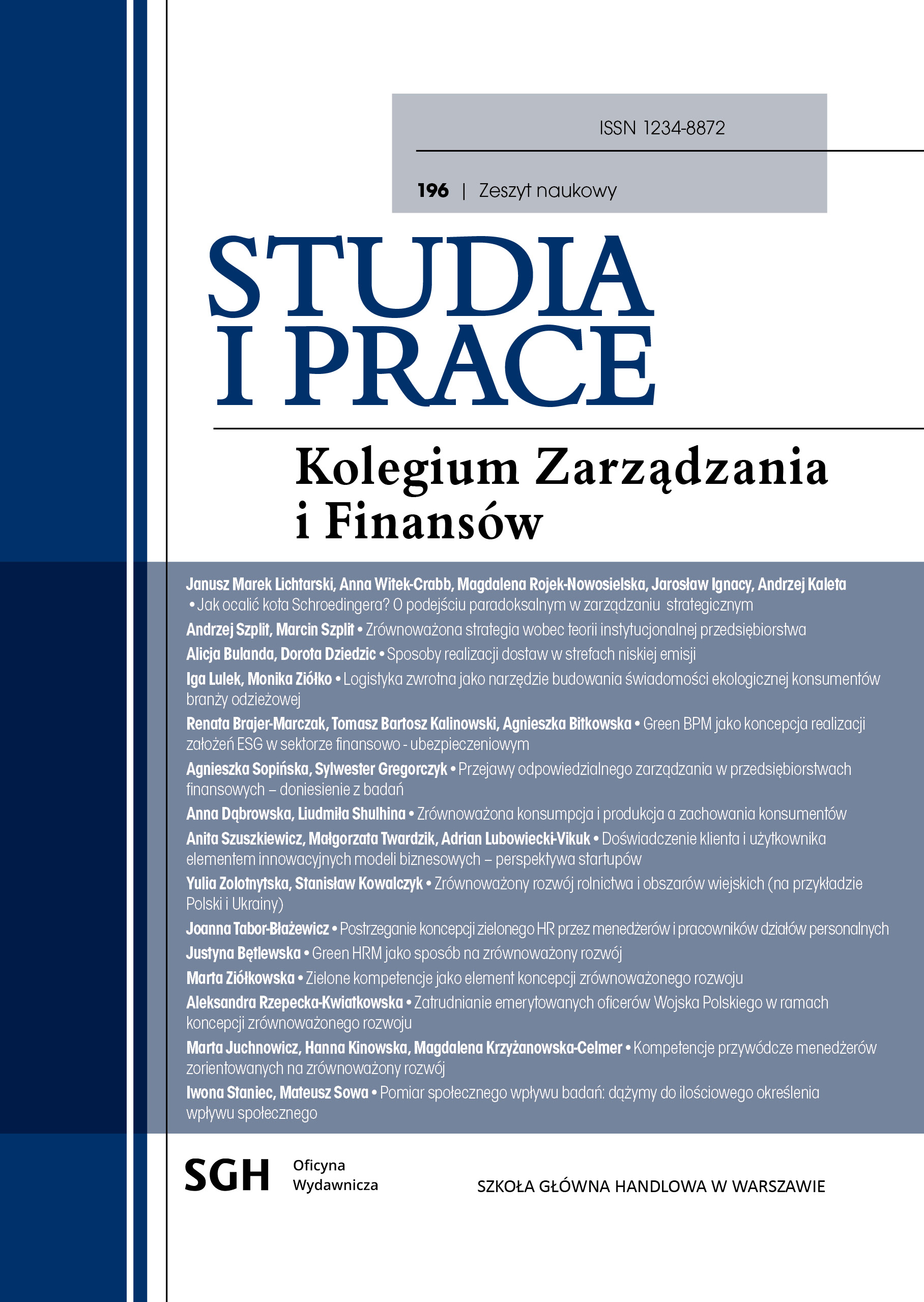Sustainable strategy versus the institutional theory of the business enterprise
DOI:
https://doi.org/10.33119/SIP.2024.196.2Keywords:
institutionalism, balance, strategic management, sustainability, strategyAbstract
The increasing turbulence of the environment makes the classic methods of building strategies and operating principles of enterprises less useful. This applies even to the basic assumptions of relationship management, both from an epistemological and methodological perspective. Due to the current socio-economic problems related mainly to climate change, pressure on appropriate (sustainable and stable) development plays a special role. The aim of the publication is to explore the possibilities of building a responsible enterprise strategy within the framework of social and ecological conditions. The publication refers to the research of Rafał Krupski and his concept of creating a strategy with the requirements of identifying opportunities and defining redundancy of resources and competences. According to Krupski, sustainable growth is an idea of behaviour in an environment where conditions of uncertainty are common. This may mean that the local optimum treated autonomously may be one of the worst solutions from the point of view of the global optimum. Professor Krupski encourages further scientific research on the problems of balance between the organization and its environment because they are of fundamental importance to the theory and practice of strategic management. With reference to these recommendations, the authors of the study consider the assumptions of the institutional theory of the business enterprise in their research.
Downloads
References
Wydawnictwa zwarte
Galbraith, J. K. (1979). Ekonomia a cele społeczne. Warszawa: Polskie Wydawnictwo Ekonomiczne.
Krupski, R. (2009). Planowanie strategiczne – problemy i kierunki badań. W: Zarządzanie strategiczne. Problemy, kierunki badań (s. 21–32), R. Krupski (red.). Wałbrzych: WWSZiP.
Krupski, R. (2013). Teorie zmian w teorii zarządzania strategicznego. Próba kojarzenia. W: Zarządzanie strategiczne. Quo vadis? (s. 93–104), R. Krupski (red.). Wałbrzych: WWSZiP.
Krupski, R. (2007). Jak radzić sobie z niepewnością w planowaniu strategicznym? W: Zarządzanie strategiczne w warunkach niepewności (s. 95–106), R. Krupski (red.). Wałbrzych: WWSZiP.
Misiński, W. (2021). Instytucjonalna teoria przedsiębiorstw (a): paradygmat (?) czy wstęp (?) do instytucjonalnej (?) teorii (?) przedsiębiorstw(a) (?). Wrocław: Wydawnictwo Uniwersytetu Ekonomicznego we Wrocławiu.
North, D. C. (1990). Institutions, Institutional Change and Economic Performance. Cambridge: The Cambridge University Press.
Oleksyn, T. (2020). Zarządzanie. Wybrane kwestie. Warszawa: Difin.
Romanowska, M. (2014). Bariery efektywności badań naukowych z zakresu zarządzania strategicznego. W: Zarządzanie strategiczne. Rozwój koncepcji i metod (s. 101–107), R. Krupski (red.). Wałbrzych: WWSZiP.
Wilkin, J. (2016). Instytucjonalne i kulturowe podstawy gospodarowania. Warszawa: Wydawnictwo Scholar.
Williamson, O. E. (1998). Ekonomiczne instytucje kapitalizmu. Firmy, rynki, relacje kontraktowe. Warszawa: Wydawnictwo Naukowe PWN.
Artykuły naukowe
Krupski, R. (2011). Okazje w zarządzaniu strategicznym przedsiębiorstwa, Organizacja i Kierowanie, 4, s. 11–24.
Rokita, J. (2003). Dylematy zarządzania współczesnymi przedsiębiorstwami, Biuletyn Ekonomisty. Biuletyn Naukowo-Informacyjny, 1(31).
Rudolf, S. (2016). Nauki o zarządzaniu z perspektywy nowej ekonomii instytucjonalnej, Prace Naukowe Wyższej Szkoły Bankowej w Gdańsku, 48, s. 37–50.
Suszyński, C. (2019). Redundancja jako kluczowa kategoria podejścia zasobowego, Studia i Materiały. Miscellanea Oeconomicae, 23 (2), s. 73–85.
Szplit, A. (2022). Partnerstwo publiczno-prywatne skuteczną hybrydą społeczno-ekologicznego gospodarowania, Studia i Prace Kolegium Zarządzania i Finansów SGH, 183, s. 47–60.
Szplit, A., Szplit, M. (2016). Od efektu Ringelmanna do redukcji kosztów relacyjnych, Prace Naukowe Uniwersytetu Ekonomicznego we Wrocławiu, 421, s. 570–578.
Wilkin, J., Kargol-Wasiluk, A., Zalesko, M. (2019). Równowaga instytucjonalna – fundament równowagi gospodarczej, Ekonomista, 6, s. 659–679. Zrównoważona strategia wobec teorii instytucjonalnej przedsiębiorstwa 39
Materiały internetowe
Marcinkowski, J. (2023). Mnie się nie da zastąpić sztuczną inteligencją, https://wroclaw.wyborcza.
pl/wroclaw/7,35771,29764431, mnie-sie-nie-da-zastapic-sztuczna-inteligencja-tam-niema.html (dostęp: 15.01.2024).
Downloads
Published
How to Cite
Issue
Section
License
Copyright (c) 2024 Studies and Work of the Collegium of Management and Finance

This work is licensed under a Creative Commons Attribution 4.0 International License.









